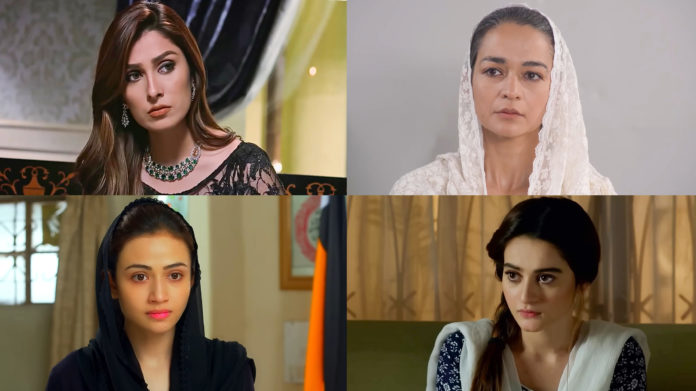In recent years, Pakistani dramas have become increasingly progressive in their representation of women. Instead of portraying women as passive and submissive characters, many dramas are now showcasing strong, independent female characters who challenge patriarchal norms and expectations.
These female characters are breaking through barriers and entering traditionally male-dominated fields. They are pursuing careers, fighting for their rights, and standing up against harassment and violence. By doing so, they are creating new role models for young women and challenging traditional gender roles.
Prime Examples of Women Representation in Pakistani Dramas
One drama that stands out in this regard is “Udaari“, which tackled the sensitive issue of child sexual abuse. The drama featured a strong female lead in Ameera Majid (Urwa Hocane) who stood up against her abuser, defying societal norms and expectations to seek justice for herself and others.
Similarly, “Khaani” portrayed a woman (Sana Javed) who stood up against a powerful man and challenged the traditional notion of male dominance. The drama tackled themes of revenge, justice, and the fight against corruption, with the female lead emerging as a strong and resilient character who refused to back down.
Are we Still There?
While there are a few exceptions, most dramas continue to present women in the same old roles of the damsel in distress or the traditional housewife. By presenting women as helpless and in need of male protection, these dramas are doing a disservice to the progress made toward gender equality and undermining the empowerment of women.
The stories fail to capture the full complexity and diversity of women’s experiences, presenting a limited and narrow view of what it means to be a woman in Pakistani society. By perpetuating the same old stereotypes and tropes, these dramas are not only limiting themselves creatively but also failing to reflect the reality of the world around us.
Dramas That Pander to Patriarchal Norms
Many dramas still perpetuate harmful stereotypes and reinforce patriarchal norms, portraying women as objects to be controlled or possessed by men.
One example is the popular drama “Ishq Tamasha”, which portrayed women as manipulative and deceitful, reinforcing negative stereotypes and promoting a culture of mistrust and suspicion. Similarly, “Mere Paas Tum Ho” was criticized for its portrayal of a woman who cheated on her husband, reinforcing the notion that women are irresponsible beings.
The Roles Artists and Writers Play
As artists and storytellers, we have the incredible privilege of crafting characters that capture the imagination and inspire awe. However, with great creative freedom comes great responsibility. While we have the liberty to create characters as we see fit, we must also be mindful of the impact these characters can have on our audiences, particularly on impressionable minds.
These negative portrayals of women are harmful and hurtful to the feminine cause, reinforcing harmful stereotypes and undermining progress toward gender equality. It’s important for Pakistani dramas to move away from these harmful tropes and promote more positive, empowering representations of women.
By breaking out of their bubble and presenting more positive and empowering portrayals of women, Pakistani dramas can help to promote gender equality and create a more just and equitable society for all.
Our Verdict
In conclusion, as we celebrate Women’s Day, it’s important to reflect on the progress made toward gender equality in Pakistani society, including in the representation of women in dramas.
While many dramas have made progress in their portrayal of strong, independent female characters, there is still much work to be done to combat harmful stereotypes and promote a more positive and empowering vision of women. By continuing to push for progress and speaking out against harmful portrayals of women, we can create a more equal and just society for all.




